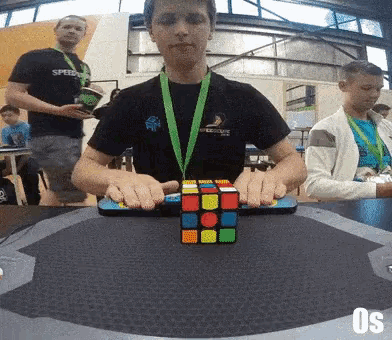For those new to speedcubing, it's a puzzle-solving challenge where cubers aim to solve the Rubik's Cube as quickly as possible. The objective is to align all the cube's colors correctly while racing against the clock for the fastest solve time. Achieving a fast solve time is the goal.
This timer is carefully designed to keep track of solving times, giving valuable information and making the speedcubing experience even better. It's an essential tool for speedcubers who appreciate quality.

I have a passion for statistics and find immense value in extracting meaning from data. This process often unveils insights you may not have even been aware of. In pursuit of this goal, I have included what I called the "Category Aggregation Principle."
The core concept of the Category Aggregation Principle centers around the systematic consolidation and unification of statistical data from multiple items within the same category. This principle advocates for treating these data points as both a collective analysis and as a singular category simultaneously.
In practical terms, the Category Aggregation Principle empowers speedcubers to compute and analyze statistics not just for individual categories but also for each individual cube within the same category without affect or modify overall calculations. This is especially valuable for individuals looking to enhance their performance, monitor their progress and maintain a detailed history of their cube-solving journey with variations in cubes, methods or both at the same time, without modify final category calculation!
You can enjoy solving the GAN 356 CFOP cube using the CFOP method, and later switch to the GAN 356 ROUX cube, employing the ROUX method. After completing a round of solves, you'll still have accurate category calculations, including Best Time, Deviation, Mean, Ao3 - Ao1000, and more. Additionally, you can access specific and filtered detailed statistics for each cube, giving you a comprehensive understanding of your performance with the GAN 356 CFOP and GAN 356 ROUX cubes and others.
This is what makes unique and versatile Nexus Timer.
- Node & NPM Installed
- Clone the repo
git clone https://github.com/bryanlundberg/NexusTimer.git
- Install NPM packages
npm install
- Run a script available (
npm run dev-npm run build-npm run start)npm run dev

- Scrambles
- Support WCA regulations
- Add logic to avoid cancel moves
- Add Megaminx - Scrambles
- Add SQ-1 - Scrambles
- Some others possible categories
- Localization and Accessibility
- Enhance and expand translations
- Add touch support for timer in mobile devices
- User Preferences and Interaction
- Import / Export times
- Incorporate smooth animations
- Modal opening and closing
- Doing a personal best (PB)
- Other interactive alerts
- Cloud support (Backend)
- Move from localStorage to server storage
See the open issues for a full list of proposed features (and known issues).

Contributions are what make the open source community such an amazing place to learn, inspire, and create. Any contributions you make are greatly appreciated.
If you have a suggestion that would make this better, please fork the repo and create a pull request. You can also simply open an issue with the tag "enhancement". Don't forget to give the project a star! Thanks again!
- Fork the Project
- Create your Feature Branch (
git checkout -b feature/AmazingFeature) - Commit your Changes (
git commit -m 'Add some AmazingFeature') - Push to the Branch (
git push origin feature/AmazingFeature) - Open a Pull Request
Distributed under the MIT License. See LICENSE.txt for more information.











